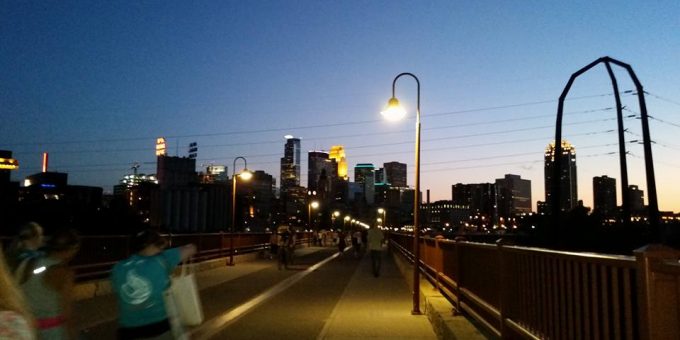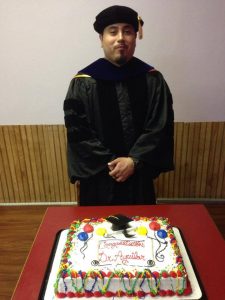
Today, The Society Pages reposts this original essay, written last summer as part of the Wonderful/Wretched series. Wonderful/Wretched is a collection of twenty-one essays on the racial dynamics of the Twin Cities written by social scientists with ties to the metro area in response to the killing of George Floyd. Wonderful/Wretched has since been revised and expanded in a published volume, Sparked: George Floyd, Racism, and the Progressive Illusion available through the Minnesota Historical Society. For the remainder of the summer, in celebration of Sparked’s publication, and in reflection of the year that has passed since last summer’s historic uprising for racial justice, The Society Pages will repost essays from Wonderful/Wretched in their original form.
Upon arriving in Minneapolis, my friends put me on to the sounds of the beloved musician, Prince. I had heard his music growing up but put little attention to it as I was more immersed into hip-hop, G-Funk, Mexican Corridos, and Salsa. I fell in love with his music as an adult. When I listen to Prince’s catalogue today, I cannot help reminisce of my youthful days in the Twin Cities as a young grad student. Recently, I find myself frequently listening to his “Uptown” number from his Dirty Mind LP. The song appears on many of my curated playlists, inspiring me on my daily runs and exercise routines. Yet, the song brings new significance to me not only as I reflect back on my time living in South Minneapolis, but also as I process the killing of George Floyd at the hands of Minneapolis Police officers on Memorial Day of this current year.
Prince presented “Uptown” to be a rather inclusive space where people of color and Whites could party and hook up with little judgment. He proclaimed in this specific song, “White, Black, Puerto Rican, everybody just a-freakin’/Good times were rolling.” I recall spending many days in Minneapolis’ Uptown neighborhood digging for music at Cheapo Records, meeting friends for evening drinks, and spinning vinyl at various establishments like Muddy Waters and Nightingale. These memories of Uptown will always remain pleasant in my mind. Yet, I also remember a stratified Uptown, where everyone was supposedly going, but the area serviced a predominantly affluent White consumer with businesses placing their majority White staffs front and center. Immigrants and racialized minorities also labor in Uptown but are often tucked away in kitchens as cooks and dishwashers. Out of sight! I became acquainted with many service industry workers in Uptown, who were lovely and attended to my food and beverage requests when I DJed in different establishments (often my fellow DJs and myself were the only visible people of color in these bars and restaurants spinning Black and Latinx music). I often had to walk into kitchens to borrow restaurants’ sound equipment for my sets. It was these small moments that I met many Latinx workers, hidden out of public view, greeting them in Spanish with a “Qvo” (what’s up) or a genuine “hola.”
I did not move to Minneapolis with intentions of becoming a part-time DJ. I moved to Minnesota in 2007, after being born and raised in Chicago, to pursue a PhD in American Studies at the University of Minnesota. Very much like Uptown and its establishments, I found myself in a very predominantly white space while at “The U.” Whenever I paid visits to the library, I would browse the floors housing the bounded MA and PhD theses hoping to find ones written by former Latinx grad students. I found my grad program academically rewarding as I sharpened my scholarly tools to analyze race, migration, political economy, class, and empire. My peers in the program were bright and in solidarity with workers’ rights, immigrant rights, indigenous peoples’ struggles, African American and Black struggles (the Black Lives Matters movement came in the later years of my studies), and queer struggles. We pushed the field of American Studies in unique ways by producing scholarship denouncing American empire, American exceptionalism, racism, anti-immigrant rhetoric, and anti-intellectualism. Yet, something still felt out of place for me during my time at the University of Minnesota. I constantly dealt with imposter syndrome as a first-generation grad student of color. I recall sitting in several grad seminars, struggling to stay afloat with the readings, having a difficult time making sense of the scholarly theories, while many of my peers entered the program fluent in Foucault, and Spivak. I needed to play catch-up and fast. I was not prepared for what graduate school had in store for me even though I had participated in the McNair Scholars program and conducted undergraduate research during my time at the University of Illinois at Chicago.
My previous life experience and undergraduate education could not prepare for making sense of the racial dynamics of Minneapolis either. I had to learn how the city was mapped out racially through experiences, not only through scholarship. Uptown, for example, was and continues to be a very White space in Minneapolis. It was also the place many of my grad student peers secured housing. So I found myself spending lots of time there, traveling from my apartment in the adjacent Loring Park neighborhood (another predominantly White space). My friends and I often tried to find refuge at waterholes and other establishments when celebrating milestones and routinely venting about the social structures that placed trauma in our lives and those of our families.
On one specific night, I attended my friend’s celebration when he successfully defended his prelims (the exams PhD students must complete in order to advance in their doctoral program) at the VFW hall in Uptown. The place was dingy and dark. The bulk of the patrons were working-class White and Black people in their mid-to-late forties. I remember one older White woman came to speak to my group after an incident where a Black woman publicly shamed a male patron for sexist behavior. The White women sided with the Black female against the guilty patron during the altercation. She received praises from our group for doing so. When she came to speak to our party, she provided details about her upbringing as a working-class White Ethnic woman in a Northeastern city. At one point, the conversation took a turn for the worst. She blurted, “Fuck Ecuadorians,” and moments later said, “They forgot about us [White folks].” We were all taken aback at her comments. My friends looked at me to see if I felt attacked by the woman’s anti-Latino remarks. Knowing that I am a Chicano male, my friends wanted to ensure my personal safety and kindly asked me if we should take the party elsewhere. I politely said I was fine and suggested we stay put at the VFW. I could not help but feel a real sense of feeling out of place during this moment. I wanted to disappear. I did not think about scholarly texts at that very moment. My mind was in complete shock that this woman felt comfortable enough to express her discontent against a particular ethnic Latinx group. Looking back at this incident, I realized her comments attacked Ecuadorians but she also attacked Latinx immigrants, African refugees, and Hmong refugees that had made Minnesota their homes.
I reflect on the incident now using a scholarly lens with the help of key texts like Leo Chavez’s seminal book The Latino Threat and David Roediger’s Working Towards Whiteness to better contextualize how this woman’s discontent with immigrants was filled with xenophobia and nativism. The same xenophobia and nativism fueling much of current popular conservativism including the brand embodied by the 45th President of the United States. Her remark, “they forgot about us” recently resurfaced in Minnesota as the state’s Beltrami County symbolically voted to prevent refugees from resettling in their jurisdiction. These words also reminded me how the City of Lakes, which welcomes immigrants and hosts an annual May Day parade filled with youthful progressive activists, is still home to individuals and groups invested in preserving the status quo where police officers could kill Black men with excessive force and local residents could resent immigrants. As a child of one immigrant parent and a second-generation Chicana mother, this woman’s words stung that night and continue to sting today. I guess Prince was right. “Everybody’s going Uptown” including young White partygoers, youth of color, immigrant workers, grad students, military vets, and anti-immigrant locals. I just hope we create an Uptown like the one imagined in Prince’s song where immigrants, people of color, queer youth, progressive Whites, Indigenous peoples, refugees can all partake in the “good times.”The George Floyd uprisings gave Black communities and people of color the medium to articulate a sense of discontent against years of systemic racism in the Twin Cities. It is also provided spaces for many residents to reimagine and now rebuild the city in unique ways. If we look past the rubble from the burnt down big box stores, we will see community members making Minneapolis home and helping others do the same by providing food, financial assistance, and spaces for creativity. This is the Minneapolis I want to imagine now that I am physically distant from the city. It is the city where I spent the bulk of my twenties, made lifelong friendships, and met my future wife at First Avenue. I also earned an advanced degree from the University of Minnesota which has allowed me the opportunity to enter the faculty ranks as I am currently an Assistant Professor of Latino Studies & American Studies at Kennesaw State University. Minneapolis will always be home (second to Chicago). My only hope is that current residents make room for more people who look like me and have similar immigrant backstories.
Marietta, GA
July 15, 2020
Return to the Wonderful/Wretched Series introduction.
Link to purchase Sparked: George Floyd, Racism, and the Progressive Illusion
